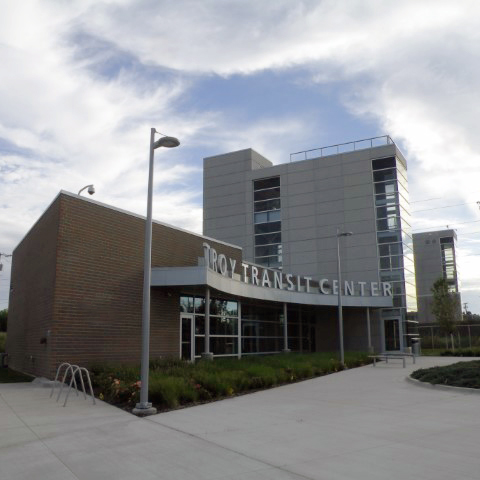Troy, MI (TRM)
Opened in late 2014, the new multimodal center brings together the services of Amtrak, SMART buses and taxis; walls of glass create a bright and airy waiting room.

Troy Transit Center
1201 Doyle Drive
Troy, MI 48084
Annual Station Ridership (FY 2023): 30,417
- Facility Ownership: City of Troy
- Parking Lot Ownership: City of Troy
- Platform Ownership: City of Troy
- Track Ownership: Canadian National Railway Company (CN) Grand Trunk Western (GTW) (A subsidiary of CN)
Derrick James
Regional Contact
governmentaffairschi@amtrak.com
For information about Amtrak fares and schedules, please visit Amtrak.com or call 1-800-USA-RAIL (1-800-872-7245).
On October 14, 2014, Troy city officials, joined by residents and representatives from Amtrak, the Michigan Department of Transportation and other organizations, cut the ribbon on the new Troy Transit Center, which brings together the services of Amtrak, Suburban Mobility Authority for Regional Transportation (SMART) buses and taxis. The new facility replaces the former station, an enclosed shelter, located across the tracks in Birmingham.
In the 1990s, Troy and neighboring Birmingham began to consider the creation of a new multi-modal center to serve both communities. Unable to secure trackside property at a price that fell within its budget, Birmingham withdrew from the project in early 2011. Troy leaders chose to continue planning for the $6.3 million multi-modal center, which was fully funded through a federal High Speed Intercity Passenger Rail grant.
Designed by local architectural firm Neumann/Smith, the one story, 2,000 square foot brick building includes a waiting room and restrooms; large expanses of glass allow natural light to flood the interior. Passengers may take advantage of free Wi-Fi and vending machines. A pedestrian bridge over the tracks allows access to the western platform and protects passengers from inclement weather.
To the northwest of the transit center on the western side of the tracks stands the historic Grand Trunk Western Railway (GTW) depot, long since converted into a commercial space. Growth of the Detroit metropolitan area and the introduction of automobile travel in the early 20th century resulted in the widening of Woodward Avenue. As part of this effort, the GTW was forced to relocate its tracks in the 1920s; it hired the Detroit firm of Aldinger and Walbridge to construct a new, steel-framed depot in Birmingham.
The picturesque Tudor Revival style depot has an asymmetrical façade dominated by a large, projecting, gabled entrance faced in white limestone with an arched doorway protected by a canopy. Flanking the main entrance are two gables featuring decorative timberwork panels set with red-brown brick in herringbone and basket weave patterns. Built at a cost of $125,000, the building was dedicated in 1931 during a ceremony that included a speech by the governor, a parade and a concert.
After a half century of use, the depot closed to passengers in 1978 due to mounting maintenance costs. In 1984, the building was restored and converted into a restaurant, a function which remains today. Recognized for its strong historic integrity and important social role within the community, it was placed on the National Register of Historic Places in 1985.
European-Americans began settling this area of Michigan largely after 1819. Many of the original residents migrated west from New York State, whether traveling overland around the Great Lakes or by the Erie Canal and then by water to Detroit. For much of the 19th century, the land that today comprises Troy was known for its fine agricultural uses. Farmers grew corn, wheat, melons and fruits, and produced wool and a variety of dairy products. Industries such as milling never developed because there were no fast moving streams or rivers that could provide waterpower.
In 1821, Johnson Niles of upstate New York purchased 160 acres in the region and moved there with his family. The area around his home became known as Troy Corners (today the intersection of Square Lake Road and Livernois Road). Niles played many roles in developing the township, working as a farmer, carpenter, innkeeper, postmaster and merchant. He later became a county commissioner and served as a representative in the first legislature convened by the new state of Michigan in 1837. By 1834, Troy Township included more than 1,100 residents, including a blacksmith, shoe maker, merchants, doctors and lawyers.
Niles and other early residents believed that Troy Corners would become a bustling commercial center, but their hopes were dashed when the state’s first chartered rail line between Detroit and Pontiac bypassed Troy Corners in favor of Royal Oak. As the 19th century gave way to the 20th, the community benefitted from new transportation links. Interurban street car service operated by the Detroit United Railway along Livernois Road connected Troy Corners with growing Detroit to the south and Flint to the north, thereby adding to the town’s attractiveness as a suburb.
Like much of the metropolitan Detroit area, Troy grew exponentially after World War II as automobile and other manufacturing sectors expanded into the suburbs and attracted residents. To manage this growth, Troy Township incorporated as a city in December 1955. Today, it counts more than 80,000 residents and is known for its fine schools and shopping destinations. Coupled with an expansive park system, the city remains a sought-after suburb a century after it was first connected to Detroit by streetcar.
For those interested in the city’s past, a visit to the Troy Historical Village offers a walk back in time. The core of the collection, gathered around the Village Green, includes 11 historic structures that trace life in the region from early pioneer days. Visitors can explore a log cabin, one-room school house, print shop and a general store. The Troy Historical Society, which manages the park, offers educational programs and historical reenactments throughout the year. In 2010, the old Johnson Niles house was moved on site. This structure, whose original section dates to 1837, has born witness to the area’s dramatic transformation from agricultural center to bustling city.
The Wolverine Service is financed primarily through funds made available by the Michigan State Department of Transportation.
Station Building (with waiting room)
Features
- ATM not available
- Elevator
- Payphones
- No Quik-Trak kiosks
- Restrooms
- Unaccompanied child travel not allowed
- No vending machines
- No WiFi
- Arrive at least 30 minutes prior to departure
Baggage
- Amtrak Express shipping not available
- No checked baggage service
- No checked baggage storage
- Bike boxes not available
- No baggage carts
- Ski bags not available
- No bag storage
- Shipping boxes not available
- No baggage assistance
Parking
- Same-day parking is available; fees may apply
- Overnight parking is available; fees may apply
Accessibility
- Payphones
- Accessible platform
- Accessible restrooms
- No accessible ticket office
- Accessible waiting room
- Accessible water fountain
- Same-day, accessible parking is available; fees may apply
- Overnight, accessible parking is available; fees may apply
- No high platform
- No wheelchair
- Wheelchair lift available
Hours
Station Waiting Room Hours
| Mon | 12:01 am - 02:00 am 05:00 am - 06:30 am 10:00 am - 06:30 pm |
| Tue | 12:01 am - 02:00 am 05:00 am - 06:30 am 10:00 am - 06:30 pm |
| Wed | 12:01 am - 02:00 am 05:00 am - 06:30 am 10:00 am - 06:30 pm |
| Thu | 12:01 am - 02:00 am 05:00 am - 06:30 am 10:00 am - 06:30 pm |
| Fri | 12:01 am - 02:00 am 05:00 am - 06:30 am 10:00 am - 06:30 pm |
| Sat | 12:01 am - 02:00 am 05:00 am - 06:30 am 10:00 am - 06:30 pm |
| Sun | 12:01 am - 02:00 am 05:00 am - 06:30 am 10:00 am - 06:30 pm |


 Amtrak established the Great American Stations Project in 2006 to educate communities on the benefits of redeveloping train stations, offer tools to community leaders to preserve their stations, and provide the appropriate Amtrak resources.
Amtrak established the Great American Stations Project in 2006 to educate communities on the benefits of redeveloping train stations, offer tools to community leaders to preserve their stations, and provide the appropriate Amtrak resources. For more than 50 years, Amtrak has connected America and modernized train travel. Offering a safe, environmentally efficient way to reach more than 500 destinations across 46 states and parts of Canada, Amtrak provides travelers with an experience that sets a new standard. Book travel, check train status, access your eTicket and more through the
For more than 50 years, Amtrak has connected America and modernized train travel. Offering a safe, environmentally efficient way to reach more than 500 destinations across 46 states and parts of Canada, Amtrak provides travelers with an experience that sets a new standard. Book travel, check train status, access your eTicket and more through the